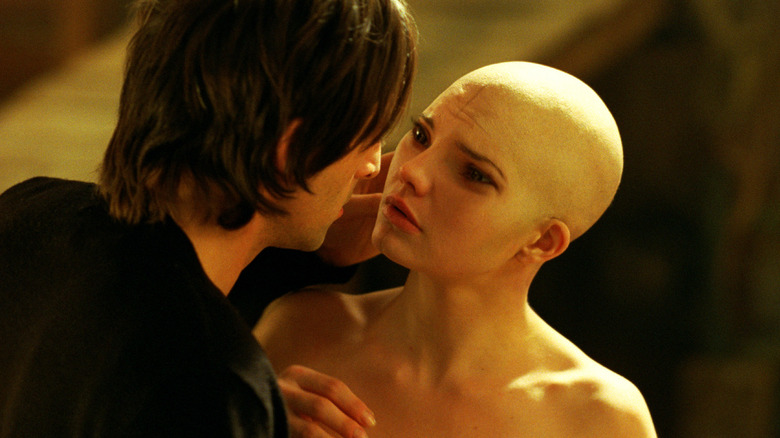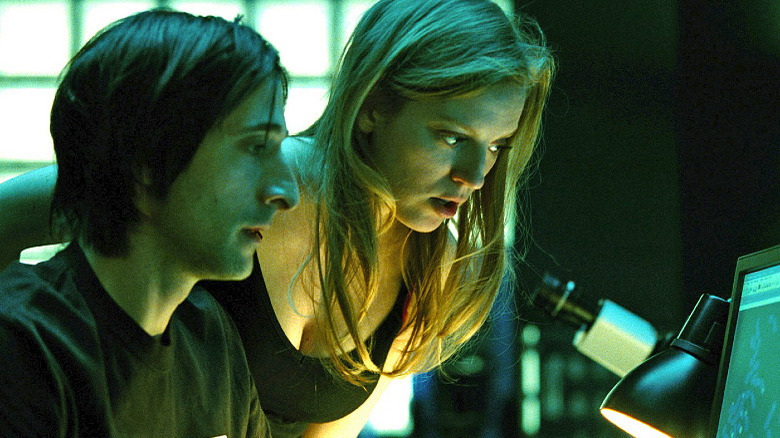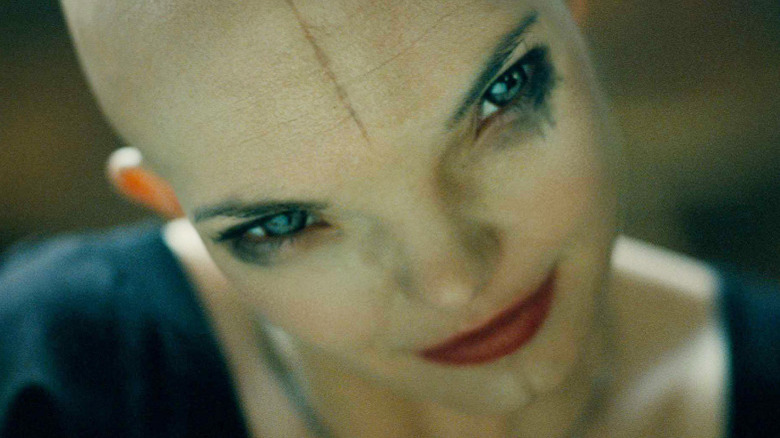Why Splice Bombed At The Box Office, And What We Can Learn From It
American-born Canadian director Vincenzo Natali has shown a knack for being tuned into the zeitgeist of both the sci-fi and horror scenes. His 1997 feature film debut, "Cube," preceded the "Saw" and "Escape Room" movies in pitting strangers up against sadistic traps meant to test their wits and will to live. His second film, 2002's "Cypher," has the same paranoid atmosphere and noir-meets-cyberpunk aesthetic as "Dark City," "The Matrix," and other sci-fi thrillers from around the time of its release. Even when he shifted to working more on TV, Natali found himself directing trail-blazing genre series like "Hannibal," "Orphan Black," and "Westworld."
Every rule has an exception, though — and for Natali, it's his 2010 film "Splice," at least so far as the box office goes. After premiering at the Sitges Film Festival a year earlier, "Splice" was picked up by "The Matrix" producer Joel Silver and Warner Bros. at the Sundance Film Festival in 2010. The pair had high hopes for Natali's mid-budget sci-fi horror movie, with reports at the time claiming they felt they had found "the next 'Paranormal Activity.'" But in spite of its positive reviews and heavy marketing push, "Splice" failed to make much of an impression on the moviegoing masses.
Raising Dren
Adrien Brody and Sarah Polley star in "Splice" as a pair of geneticists who, having apparently never seen any sci-fi horror film ever, decide to throw caution to the wind and splice together different types of animal DNA to create a human-animal hybrid. The two end up making Dren (played by Delphine Chanéac), a rapidly-developing human-like creature that has gills, retractable wings, a large tail with a stinger, and other traits that make them very dangerous. Things take a turn for the twisted from there, as the movie blends disturbing acts of sex and violence with deeper themes about creator-creation relationships and mankind's hubris. Unsurprisingly, Guillermo del Toro was attracted to this "Frankenstein"-style tale early on and served as an executive producer.
The relevancy of "Splice" wasn't lost on anyone. In his review of the movie, Roger Ebert said it was "well-timed to open soon after genome pioneer Craig Venter's announcement of a self-replicating cell." Comparisons to David Cronenberg's body horror work were similarly unavoidable, as were those likening the film to a more self-serious riff on Roger Donaldson's exploitive hit 1995 sci-fi horror thriller "Species." The movie's dour tone and nasty plot twists also made it divisive among critics, with some slamming it as being little more than a lewd B-movie hiding beneath its slick surface and lauded cast and creatives.
Audiences weren't exactly wowed by "Splice," giving it a D CinemaScore when it opened in theaters on June 4, 2010. The film went on to gross $28.5 million at the box office against a $30 million budget, with Silver's Dark Castle label taking the biggest hit after it committed upwards of $35 million to purchasing and promoting the movie on the heels of its run on the festival circuit.
Mistakes were made
The thing that doomed "Splice" was expectations. Where "Paranormal Activity" has an easy-to-access premise and subject matter that allowed it go from film festival gem to box office success, Vincenzo Natali's tale of parentage and playing God is far too twisted and grisly to appeal to mainstream tastes. The movie was never intended to launch a franchise, either. As Natali explained around the time of its release, the film's ominous, open-ended final scene was meant to encourage people to think deeper about the themes at the heart of "Splice." A potential sequel, on the other hand, was far from his mind.
Then there was Warner Bros.' decision to release "Splice" in the midst of the 2010 summer movie season. Had the studio positioned the film as counter-programming to the other wide releases in theaters at the time (such as "Shrek Forever After," "Iron Man 2," and "Prince of Persia: The Sands of Time"), it might have been better able to build word of mouth and thrive in a limited rollout. Instead, "Splice" was forced to go head-to-head with the biggest blockbusters of the year for space in theaters and was quickly pushed aside to make room for crowd-pleasers like "Toy Story 3" and "Despicable Me."
As for Natali, "Splice" bombing wasn't, per se, bad for his career. He was linked to some major studio projects near the time of the film's release, including a movie based on DC Comics' "Swamp Thing." Instead, he moved into TV and, later, streaming with Netflix's Joe Hill horror adaptations "In the Tall Grass" and "Locke & Key." In a way, the small screen has afforded Natali more freedom to continue telling the type of unsettling, niche stories he's always been most interested in. So maybe all's well that ends well.


